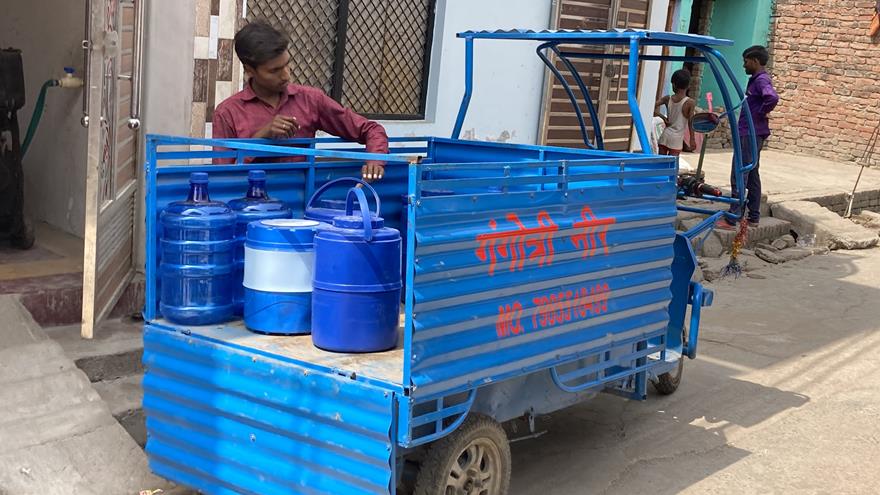FMC Corp. Partners with Drexel to Bring Safe, Clean Water to Indian Villages
FMC Corp. Partners with Drexel to Bring Safe, Clean Water to Indian Villages Drexel


The Success of a Novel Collaboration to Bring Potable Water to Villages in India

The following report highlights the success of a collaboration between Drexel University, FMC Corp., and a nonprofit organization in bringing potable water to villages in India. This initiative serves as a model for future projects involving external partners who aim to address complex issues. The report will emphasize the importance of the Sustainable Development Goals (SDGs) throughout.
Background
In 2018, FMC Corp., an agricultural sciences company based in Philadelphia, approached Drexel University with a proposal to address the issue of unsafe drinking water in rural communities in India. Recognizing the impact of unsafe water on the health and well-being of farming families, FMC sought to collaborate with Drexel and a nonprofit organization to implement a solution.
The Initiative
FMC provided $1 million in funding to support the installation of reverse-osmosis water purification centers in 56 villages across six states in India. Community Pure Water (CPW), a nonprofit organization dedicated to making safe drinking water affordable and accessible, was responsible for installing the water purification centers. This three-year program aimed to improve living standards and strengthen rural communities by providing access to safe, affordable, and reliable water, sanitation, and hygiene.
The Power of Partnerships
This collaboration exemplifies Drexel University’s commitment to harnessing the Power of Partnerships, as outlined in its 2030 Strategic Plan. By joining forces with a global company and a nonprofit organization, Drexel demonstrated its dedication to working internationally on projects that positively impact the lives of thousands of individuals.
Operational Structure
To comply with Corporate Social Responsibility (CSR) requirements, an operational structure was established. FMC-India provided CSR funds to CPW for the installation of water plants, while FMC-US granted funds to Drexel for the development and implementation of assessments. Drexel compiled a report to fulfill CSR reporting requirements.
Interdisciplinary Team
An interdisciplinary team consisting of experts from Drexel’s Academy of Natural Sciences, Dornsife School of Public Health, LeBow College of Business, and School of Education was formed. This team utilized quantitative and qualitative measurements to assess the health impact of the water plants on communities and the perception of FMC’s corporate responsibility efforts.
Results and Recommendations
Data collected over three years indicated significant progress in providing access to safe, clean water to the villages. FMC was positively recognized as a good steward in spearheading these efforts. However, the report highlighted areas for improvement, such as communication tactics and training for operators running and maintaining the water plants. Recommendations included involving village leaders in communication efforts and ensuring proper training for operators.
Health Benefits and Empowerment
Drexel researchers from the Dornsife School of Public Health focused on the potential health benefits derived from better access to potable water. Improved drinking water quality reduces the risk of microbiological contaminants that can cause illness and prevent individuals from attending school. Additionally, the installation of water plants empowered women and young girls by freeing up their time for education, skill development, and contributing to their communities.
Future Projects
While the three-year project is completed, FMC leadership continues to analyze the results and data collected. The experience gained from this collaboration will inform future projects aimed at improving access to clean water in India.
SDGs, Targets, and Indicators
1. Which SDGs are addressed or connected to the issues highlighted in the article?
- SDG 6: Clean Water and Sanitation
- SDG 17: Partnerships for the Goals
The article discusses the collaboration between Drexel University, FMC Corp., and a nonprofit organization to bring potable water to villages in India. This directly addresses SDG 6, which aims to ensure access to clean water and sanitation for all. Additionally, the partnership between the university, the corporation, and the nonprofit exemplifies SDG 17, which promotes partnerships to achieve the Sustainable Development Goals.
2. What specific targets under those SDGs can be identified based on the article’s content?
- SDG 6.1: By 2030, achieve universal and equitable access to safe and affordable drinking water for all.
- SDG 6.2: By 2030, achieve access to adequate and equitable sanitation and hygiene for all and end open defecation, paying special attention to the needs of women and girls and those in vulnerable situations.
- SDG 17.16: Enhance the global partnership for sustainable development, complemented by multi-stakeholder partnerships that mobilize and share knowledge, expertise, technology, and financial resources.
The article highlights the installation of reverse-osmosis water purification centers in villages in India, which directly contributes to achieving universal access to safe drinking water (SDG 6.1). The focus on improving access to clean water for women and girls also aligns with SDG 6.2. Furthermore, the collaboration between Drexel University, FMC Corp., and the nonprofit organization demonstrates the importance of multi-stakeholder partnerships in achieving sustainable development (SDG 17.16).
3. Are there any indicators mentioned or implied in the article that can be used to measure progress towards the identified targets?
- Percentage of villages with access to safe and affordable drinking water
- Percentage reduction in open defecation
- Perception of FMC’s corporate responsibility efforts among villagers
- Percentage increase in usage of water purification centers
- Percentage of women and girls benefiting from improved access to water
The article mentions that data was collected over three years to assess the impact of the water plants on the communities. This data can be used to measure progress towards the targets, such as the percentage of villages with access to safe drinking water and the reduction in open defecation. Additionally, the article discusses the perception of FMC’s corporate responsibility efforts among villagers, which can be an indicator of the effectiveness of the partnership. The increase in usage of water purification centers and the benefits experienced by women and girls can also serve as indicators of progress.
Table: SDGs, Targets, and Indicators
| SDGs | Targets | Indicators |
|---|---|---|
| SDG 6: Clean Water and Sanitation | 6.1: By 2030, achieve universal and equitable access to safe and affordable drinking water for all. | – Percentage of villages with access to safe and affordable drinking water – Percentage increase in usage of water purification centers |
| SDG 6: Clean Water and Sanitation | 6.2: By 2030, achieve access to adequate and equitable sanitation and hygiene for all and end open defecation, paying special attention to the needs of women and girls and those in vulnerable situations. | – Percentage reduction in open defecation – Percentage of women and girls benefiting from improved access to water |
| SDG 17: Partnerships for the Goals | 17.16: Enhance the global partnership for sustainable development, complemented by multi-stakeholder partnerships that mobilize and share knowledge, expertise, technology, and financial resources. | – Perception of FMC’s corporate responsibility efforts among villagers |
Behold! This splendid article springs forth from the wellspring of knowledge, shaped by a wondrous proprietary AI technology that delved into a vast ocean of data, illuminating the path towards the Sustainable Development Goals. Remember that all rights are reserved by SDG Investors LLC, empowering us to champion progress together.
Source: drexel.edu

Join us, as fellow seekers of change, on a transformative journey at https://sdgtalks.ai/welcome, where you can become a member and actively contribute to shaping a brighter future.







